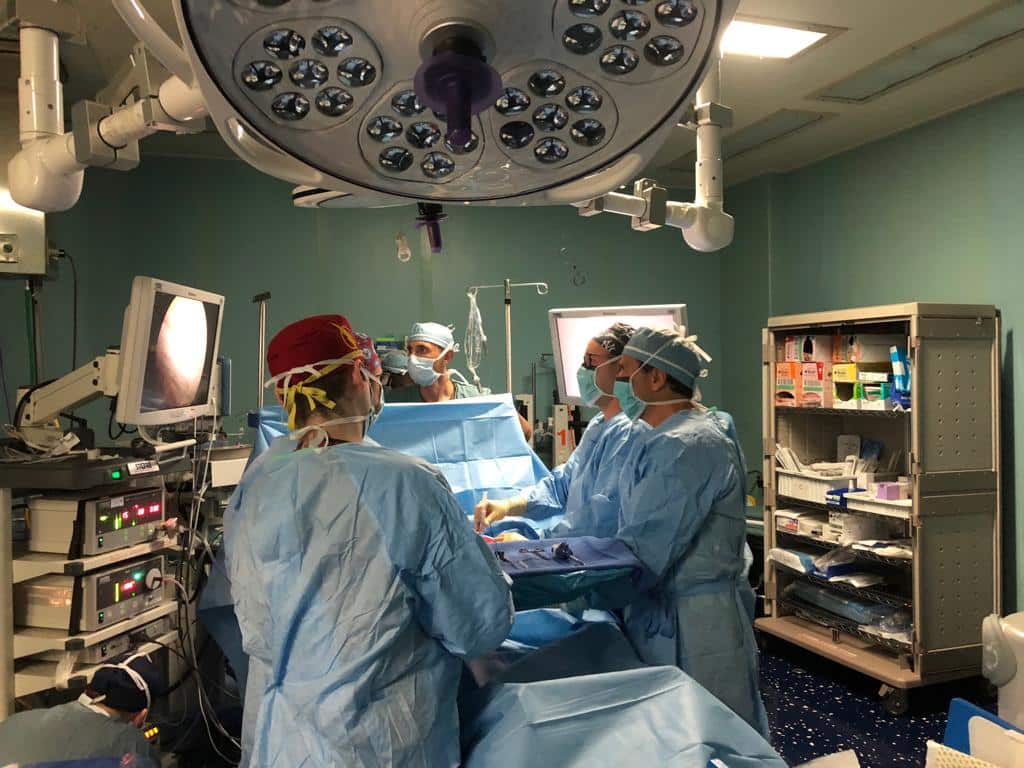
While it may not be the most pleasant topic to talk about, hemorrhoids are a common health condition that affects about 1 in 20 Americans. In fact, approximately half of adults fifty and older have hemorrhoids. If you have hemorrhoids, you may be wondering whether or not you need to have them removed.
The good news is that most hemorrhoids don’t always require surgery and can be managed with other treatments such as home remedies or diet changes. However, surgery may be necessary in cases where the hemorrhoids become so bothersome or painful that they begin to affect your daily life.
What are hemorrhoids?
Hemorrhoids are swollen, inflamed veins around the anus or in the lowest part of the rectum. They occur when the tissues supporting the blood vessels stretch. The vessels expand and the walls thin and start to bleed. As the vessels continue to stretch, the weakened vessels start to protrude or stick out. There are two types of hemorrhoids: external and internal.
External hemorrhoids are covered by sensitive skin and form near the anus. They may cause rectal bleeding or pain when you sit. They may feel like hard lumps near the anus that are swollen or tender to the touch.
Internal hemorrhoids form within the anus beneath the lining. Internal hemorrhoids rarely cause pain unless they prolapse, meaning they slip down from their usual position. Often the only sign of internal hemorrhoids is bright red blood on toilet paper after a bowel movement.
Hemorrhoids are extremely common in both men and women, and there’s nothing to be ashamed or embarrassed about. But it’s important if you do have hemorrhoids to talk to a specialist, as they can be very painful and, in rare cases, can lead to anemia, infection, or blood clots.
You are more likely to develop hemorrhoids if you:
- Strain during bowel movements
- Sit on the toilet for long periods of time
- Are older than 50
- Are pregnant
- Have diarrhea or chronic constipation
- Eat foods that are low in fiber
How are hemorrhoids treated?
There are a few ways to treat minor cases of hemorrhoids at home, including:
- Over-the-counter medication, such as aspirin or ibuprofen
- Sitting in a tub of warm water, called a Sitz bath, several times a day to relieve pain
- Not straining during bowel movements
- Eating fiber-rich foods
- Taking a stool softener or fiber supplement
- Not sitting on the toilet for long periods of time
If home remedies don’t help, there are minimally invasive procedures that can be performed in an outpatient setting:
- Rubber band ligation is a procedure where a doctor places a special rubber band around the base of the hemorrhoid. The band cuts off the blood supply, causing the banded part of the hemorrhoid to shrivel and fall off. This usually takes about a week, and scar tissue that forms in the remaining part of the hemorrhoid usually causes the hemorrhoid to shrink.
- Sclerotherapy is when a doctor injects a solution, usually a salt solution, into an internal hemorrhoid. This causes scar tissue to form and cut off the blood supply, which can shrink the hemorrhoid.
- Coagulation therapy, or infrared photocoagulation, is when a doctor uses a tool that directs infrared light at an internal hemorrhoid. The heat caused by the infrared light causes scar tissue to form, cut off blood supply, and shrink the hemorrhoid.
- Electrocoagulation is a similar technique that uses an electrical current instead of an infrared light.
What is a hemorrhoidectomy?
Not all hemorrhoids can be treated with home remedies or minimally invasive procedures. Large external hemorrhoids or prolapsing internal hemorrhoids that haven’t responded to other methods may require hemorrhoid removal surgery, or a hemorrhoidectomy. Approximately 10% of hemorrhoid cases require surgical intervention. Hemorrhoidectomies are performed under anesthesia, and most patients are able to go home the same day.
How to prepare for hemorrhoid removal surgery
Before your hemorrhoid removal surgery, your surgeon may tell you not to eat or drink anything for 8 to 12 hours prior to the surgery. You may also be asked to clear your colon by taking a laxative the night before.
Be sure to tell your doctor about any and all medications, vitamins, or supplements you are taking. You may be asked to adjust your medications to reduce the risk of complications from the procedure. If you take aspirin or a blood thinner, be sure to ask your doctor if you should stop taking it before the surgery to minimize the risk of bleeding. You should also make sure you have a ride home since it can be dangerous to drive after anesthesia or while on pain medication.
If you will need to stay overnight in the hospital, make sure you have a bag with toiletries and any medical devices you use. You should also bring a change of loose-fitting clothes.
The day of the procedure
Before the procedure, the doctor will administer an anesthetic. This may be general anesthesia, which is either inhaled or inserted into the veins; regional, which is when the doctor injects a numbing medication into the spine; or local, which is a numbing medication injected around the anus. The doctor will then make incisions around the hemorrhoid to cut it away from the sphincter muscles.
This procedure may be performed more than once if there are multiple hemorrhoids. Once the hemorrhoid is cut, the swollen vein will be tied off with a suture to prevent bleeding, and hemorrhoid will be removed. The doctor may then close the incision with a suture or leave it open if the location makes it difficult to close the wound, or if there is a risk for infection.
How long does hemorrhoid removal recovery take?
You will likely start to feel discomfort once the anesthesia and pain medication wears off. This may last anywhere from a week to up to two months after the procedure, and you may also notice some bleeding. This is normal. Your doctor will give you pain medication or you may be able to take over-the-counter medication. Your doctor may also give you stool softeners to make your bowel movements easier since you want to avoid straining.
You may need to take one or two weeks off from work after your procedure, and you should avoid heavy lifting for at least four weeks after the procedure. If you have severe anal pain and bleeding from your rectum, especially if you also have abdominal pain, diarrhea, or fever, seek medical attention right away—there may have been complications from the procedure that will also require treatment.
If you have hemorrhoids, you have options to manage them or get them removed. A PACT colorectal surgeon can help you determine whether they can be treated at home or if they will require surgery to remove them.

 Now Accepting New Patients:
Now Accepting New Patients: